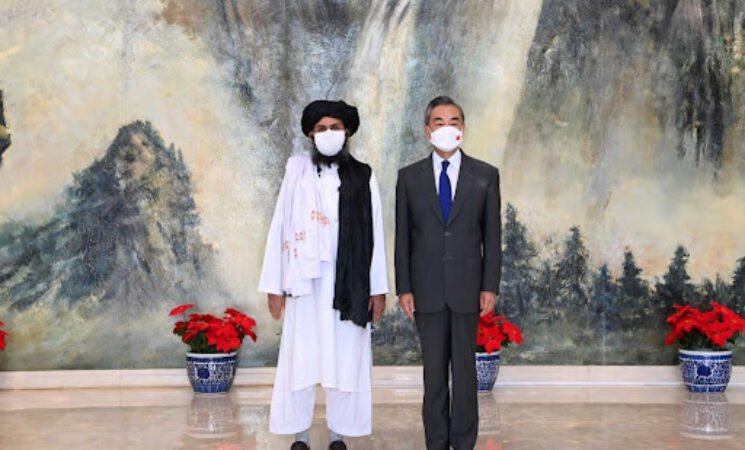1 August 2021, NIICE Commentary 7230
Chander Shekhar
A nine-member delegation of Afghan Taliban led by Mullah Abdul Ghani Baradar visited to Chinese port city, Tianjin, on 29 July 2021, on its two days visit, after official invitation by China to discuss the Afghan situation and its potentials after controlling key strategy positions in and around Afghanistan boarder. This shows, after its Russia visit, Taliban is seeking recognition from China as an emerging player in Afghanistan’s political process. China, likewise, met the Taliban envoys years ago in Beijing in year of 2019. Back in the year 2015, China also organized a peace talk between the Afghan government and Taliban in Urumqi, Xinjiang, China.
During the visit, a delegation also met the Chinese Foreign Minister and State Councilor Wang Yi. China recognizes Taliban as a “military and political force”. This public event has been interpreted as a key shift in China’s evolving interests in Afghan peace process. The visit can be seen from the shuttle diplomatic perspective, which also requires legitimacy and acceptance from both the sides. What does the government in Kabul think at his point of time? Will it accept Chinese offer as a mediator or hedge its position with other regional powers like India?
The Global Times, a Chinese newspaper, states the importance of China in Afghan peace process. According to it, “China could play the role as a better mediator between the Afghan government and the Taliban for its smooth and high-level communication with both sides whose peace talks may be stuck in stalemate for a long time”(Global Times 29 July 2021). The Xinjiang province of China borders Afghan territory on western frontier and has therefore long term strategic interest in securing stability in Afghanistan.
On the other hand, given the highly complex situation now in Afghanistan after the United States withdrew their military troop which has been an election promise of both the predecessor and the Biden administration, believed it is looking Afghan’s political development seriously. Other countries such as India which has invested lots in human and capital developments in Afghanistan also tries to make the Afghan situation to be utterly led by Afghanistan and its people as stated by the External Affairs Minister, Dr. S. Jaishankar.
This sudden withdrawal of the US troops shifted a global attention and narrative from the Indo-Pacific to the Afghan peace equation. There are concerns regarding who will regulate the peace process in Afghanistan. The basic principle of Shuttle diplomacy is the mutual trust gained by both the parties. Resetting Afghanistan political history is indeed a challenging task for all major powers. For China, peace and stability in Afghanistan territory is pivotal for the safety of its north-western province of Xinjiang, a region largely dominated by Muslims. The East Turkistan Islamic Movement (ETIM), which is a terrorist organization listed in the UN, would affect the Xinjiang province and its people’s perception. Experts have continuously been stating that China at the onset has been talking both the stakeholders in Afghanistan, the Afghan government and the Taliban. This is the realpolitik assumption of the PRC seeking a new Afghanistan while keeping its national security as its top priority. The expansion of Belt and Road Initiative (BRI) in Afghanistan is also in their agenda.
Writing in the New York Times, Steven Lee Myers argues that “the increasing legitimacy bestowed on the insurgents by regional leaders has been met largely with public silence from the Kabul government” (Myers 28 July 2021). This shows peace with the Taliban in Afghanistan is not acceptable for other party. Besides, peace, security and maintaining order in and around Afghanistan will affect the national security of other countries. Therefore, reconciliation process in Afghanistan should be such which shall be welcomed by all major countries. Likewise, peace around Afghanistan territory shall be an inclusive process because their national security is largely dependent on the stability in Afghanistan, such as India and other South Asian countries.
Moreover, India-US cooperation on the problem of Afghanistan has potential to make sure other regional powers do not dictate the peace and security in the country. It is their shared values that bind them together to prevent future war over Afghanistan. Likewise, a psychological proxy war is still going in Afghanistan where Taliban is being backed by Pakistan and China as demonstrated in this visit by the Afghan Taliban as a major stakeholder. On the same day, the US Secretary of State, Antony Blinken, and his visit to India precisely manifested its commitment to share strategic interests with India in Afghanistan peace process. S. Jaishankar likewise finds “more convergences than divergences” during the talk with the Secretary of State. They also share their views that US-India will not recognize any government in Afghanistan taken by force.
In amidst of changing global situation, it is the good opportunity for India and the US to converge their interests together on the Afghanistan peace process and shape Afghanistan future. The Shuttle diplomacy though has its own weaknesses as far as its applicability is concerned in the case of China as a mediator and its increasing ties with Taliban.
Thus, this could be stated that the fate of Afghanistan lies in democratic way and all concerned parties must come together to make Afghan stable and secure. The Chinese evolving shuttle diplomacy shall not work if it has no confidence of other parties. Afghanistan is now a potential conflict for international security particularly Asia and civil war would result in catastrophic outcomes, thereby, US-India must engage in the Afghan led peace process. The mediator between Afghan government and Taliban should be someone who believes in democracy.

